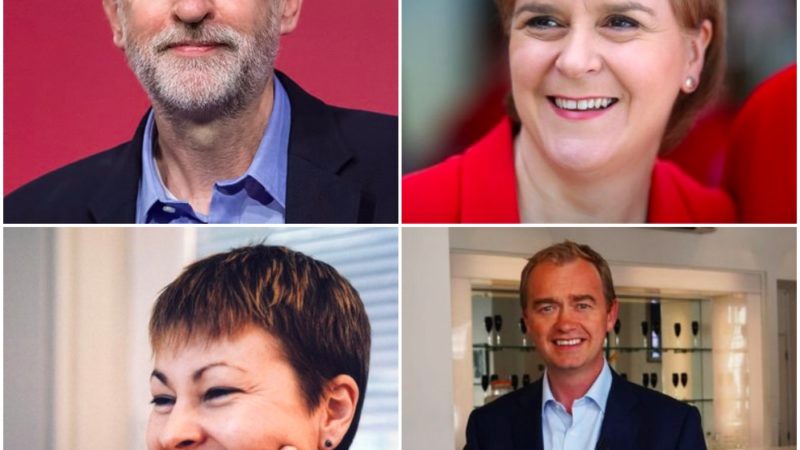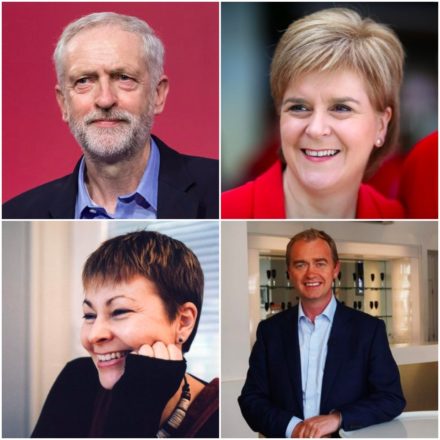

First, the basic numbers: there are 650 Commons seats. While 326 is an absolute majority, governing parties normally aim to pass the 322 mark because the seven Sinn Fein MPs do not take their seats.
The Tories are forecast to end up with 319 seats. Add 10 from the Democratic Unionist Party and you have 329.
Labour, meanwhile, had 261 MPs. When you add this to the SNP and Lib Dem groups, of 35 and 12, and the 13 which make up “others”, then you have 321.
If the DUP agrees to support a continuing Conservative government, they will have 329 seats, a combined overall majority of eight. If the other left-of-centre parties were to agree to give conditional “confidence and supply” support to a minority Labour government, that informal ‘progressive alliance’ (not a coalition) would have 321 seats, which could form a majority when you take out the role of the Speaker and three deputies.
The arithmetic seems to point to a continuing Conservative government supported in major votes by the DUP – possibly on condition that Theresa May is replaced by a new Conservative leader and prime minister, although this is unlikely.
The Conservatives can legitimately claim the right to continue in office as easily the biggest single party (with 58 more seats than Labour) and with a good prospect of an overall majority of, probably, eight seats if supported by the DUP, seven or so seats ahead of a Labour-led progressive alliance with a small overall majority. But either minority government would be unlikely to survive for very long, which would imply an unavoidable second general election within a few months. The implications of this for the conduct of the Brexit negotiations would be dire.
In a continental European election a result like this would probably lead to the formation of a Grand Alliance coalition government including both Conservatives and Labour. There might be a good theoretical case for just such a national government specifically to manage the Brexit negotiations but the history of national governments in Britain is not a happy one (older Labour people will remember the fate of Ramsay MacDonald) and it is doubtful whether Corbyn’s Labour and May’s Tories have enough in common, even just on Brexit, to be able to collaborate in a coalition government together.
There remains the puzzle of why May thinks it necessary to go to the Palace today, in the BBC’s words ,“to seek the Queen’s permission to form a government”.
The formal position is that as the incumbent prime minister heading a still functioning government then May has no need for anyone’s permission, even the Queen’s, to reshuffle her government, to present her programme for government in a Queen’s Speech when parliament meets on Monday week, and there to seek a vote of confidence for it in the Commons.
If she loses that vote despite the probable support of the DUP, and only then, would she have to resign. The Queen’s advisers would then need to decide whether she should ask Jeremy Corbyn to form a minority government, with its questionable ability to muster a majority in the Commons, or instead to dissolve parliament forthwith and call a fresh election – with the real possibility that the result would be the same, and with worrying implications for the Brexit negotiations.
Corbyn’s case for having an opportunity to try to form a government able to command the support of a majority in the house of commons in the event of May failing to do so would have been greatly strengthened if he had been actively seeking the conditional support, on a “confidence and supply” basis, of the other progressive parties before the election for a minority Labour government. But Labour’s stubborn tribalism prevented that, and even now both Corbyn and McDonnell are ruling out even any informal “deal” with other parties, instead simply challenging them to bring down a minority Labour government and having to justify to the electorate the likely consequences of bringing about such a constitutional impasse. We are living in interesting times!
Brian Barder is a former civil servant and diplomat who also served as a hospital governor and a member of the Special Immigration Appeals Commission. He campaigns on civil rights issues, writes a blog and is the author of What Diplomats Do.




More from LabourList
Supreme Court trans ruling: Ban on CLPs and branches backing ‘unlawful position’
‘How we can build a strong political centre and centre-left’
‘Building the UK’s best network: delivering digital opportunity for every community’